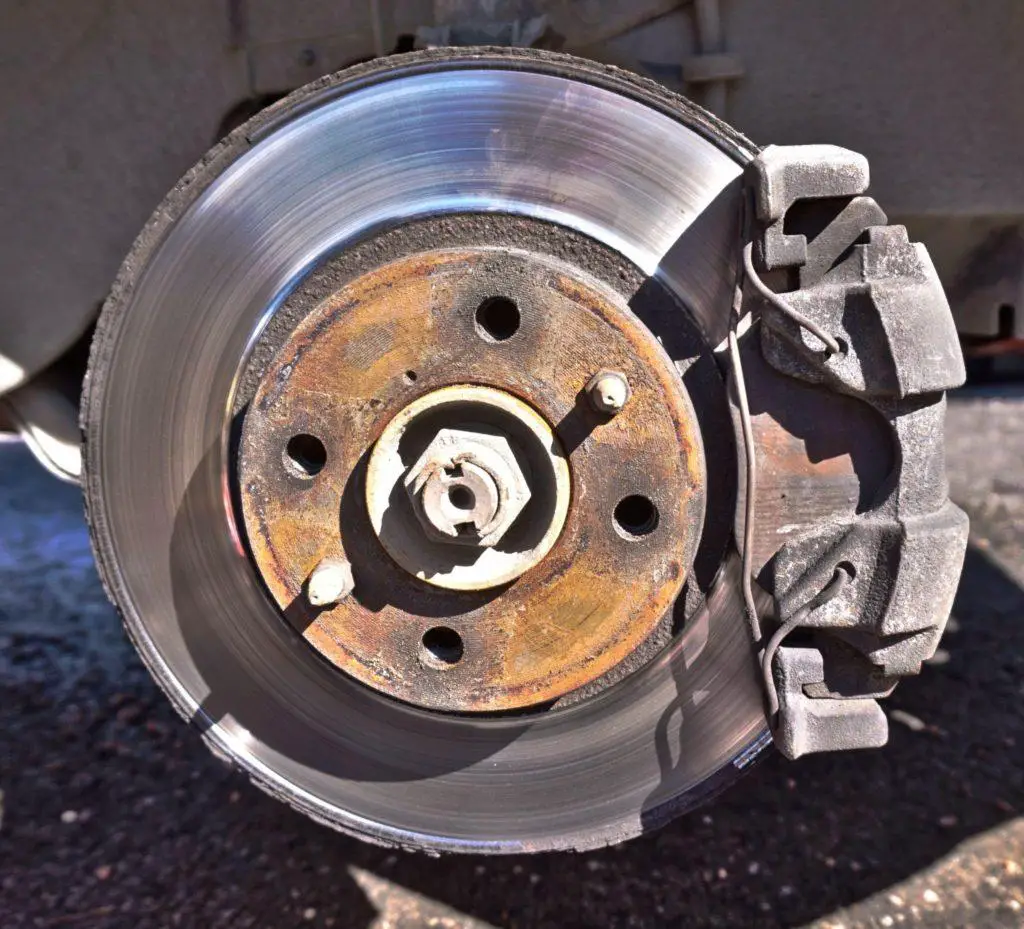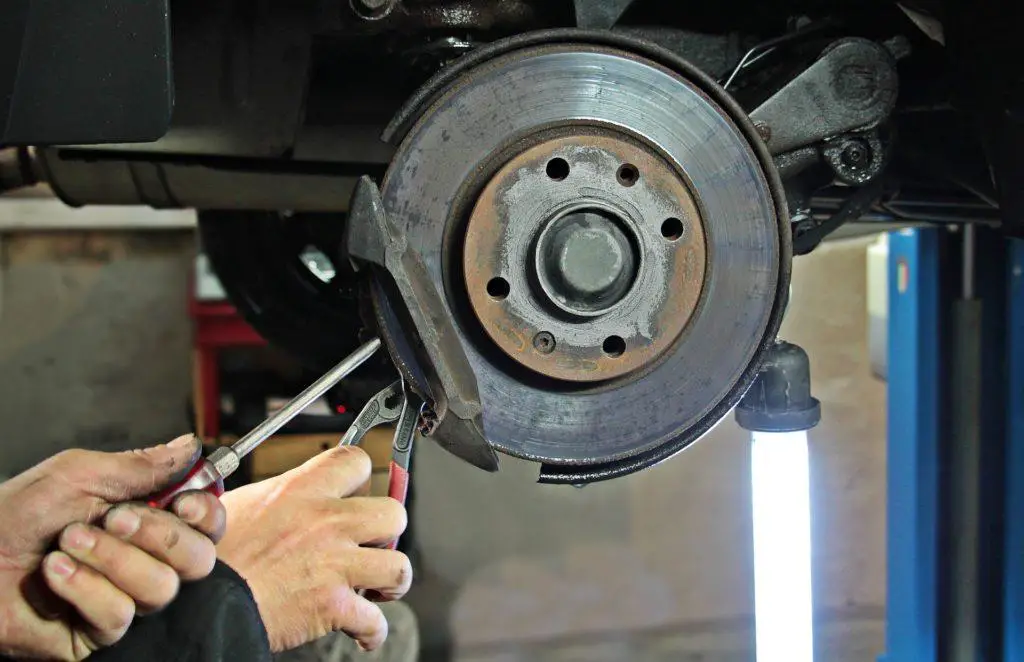Car owners often face the dilemma of unrelenting, squeaking brakes that cause a ruckus every time they start their car. Due to this, many people have been ambushed by an ear-piercing screeching noise while walking on the road.
Most of the time, this screeching noise is the friction of the pads against the braking surface. However, if the noise becomes unbearable and occasionally persistent, it’s time to address the problem. If you’re dealing with squeaking brakes, this article will help you find the root of the problem and how to stop brakes from squeaking.
Jump To
How Do Brakes Work?
Before diving into the causes of squeaking brakes, it’s worth noting that brakes sometimes make noise. The squealing sound emitted by brakes is created due to friction of materials such as a brake disc, a caliper, or brake pads.
Most brakes are generally designed to use friction between two surfaces where kinetic energy is converted to heat energy. Due to the contact between the pads and disc, you can hit the brakes to stop your car.
However, you should pay attention if you notice a persistent grinding noise or an overbearing squealing sound. Listed below are some of the causes attributed to the disturbing noise.

https://commons.wikimedia.org/wiki/File:Brake_shoe.jpg
What Causes Squeaking of Brakes?
Since we already know how important brakes are, it’s crucial to know when something is wrong. An average American spends $9,200 every 15,000 miles for general vehicle maintenance, but noticing the early signs can save you a lot of money.
When you notice a growling or any unusual sound emitted by your brake system, you should take the initiative to narrow down the causes. If you cannot find the reason, consider making a trip to your mechanic.
Worn or Thinning Brake Pads
The most common cause of brake squeaking is thinning of brake pads that wear out due to extreme abrasion and friction over time. Some manufacturers install soft metal pieces into them to extend their durability, but brake pads are ultimately bound to corrode in due course.
Most brake pads have a mechanical wear indicator that notifies you when you need to change your brakes. This indicator will tell you that your pads have completed their effective service life and make a nasty squeal every time you press the brake pedal. If the persistent squeaking turns into grinding noises, you need to change your rotors.
Bad Weather Conditions
If you live in an area that experiences heavy rain or snow, there is a high possibility of rust developing on your rotors, and the unpleasant noises you hear are the pads scraping off the surface material.
When you use brakes that have become rusted, the pads are forced to remove the dust from the rotors, which may result in debris getting caught on the brake pads. This causes an annoying noise. Similarly, if you live in a humid climate, there is a risk of moisture settling into your brakes and causing rust buildup.
When such a situation arises, it’s advisable to keep your car in the garage to prevent this from occurring. If the sound does not subside despite practicing caution, you should get your brakes checked by a professional.
Poor Brake Pad Material
In some instances, squeaky brakes may be triggered by the brake pad material itself. Brake pads usually come in three types: organic, semi-metallic, and ceramic.
Most brake pads that are made from a semi-metallic material tend to produce an occasional squeaking sound. Semi-metallic brake pads are also notorious for a lack of uniformity that disrupts the brake system, causing a deafening sound.
Most manufacturers use semi-metallic brake pads because they are readily available and comprise metallic elements like iron, steel, graphite, and copper. These pads are more prone to rust buildup since they have metallic constituents.
By far, the best alternative to semi-metallic materials is ceramic brake pads. Although these are more costly than their cheaper counterparts, ceramic brake pads are extremely durable and long-lasting.
Lack of Lubrication
Lastly, lack of lubrication at the contact points can also be responsible for squeaky brakes.
Applying proper lubricant on the brake pad edges and the side pins that float the caliper allows the smooth functioning of the brake rotor. Without these parts being properly lubricated, an odd-sounding noise is produced.
When the side pins become rusty, the calipers holding the brake pads wear down one after the other. To ensure extended shelf life, make sure that you do a regular brake service to properly clean these pins or get them replaced altogether to avoid moisture buildup.
How To Stop Brakes From Squeaking?
Once you have navigated through the main causes, you can opt for regular service of your car to keep your automobile parts intact. However, if you want a simple yet effective way to reduce unwanted noise, continue reading!

https://pixabay.com/photos/auto-repair-shop-workshop-brake-disc-1954636/
Apply Grease to the Brake Pads
One of the most common reasons for squeaky brakes is poor lubrication of the calipers. These contact points ensure smooth facilitation of the rotor framework and thereby prevent brakes from squeaking excessively.
Since modern brakes use a cast-iron disc installed between the two brake pads, you’ll need to know how to remove the brake pads safely. These types of brakes are also referred to as disc brakes. For this method, first, remove the brake pads from the calipers and then apply grease to the contact points.
Cleaning your side pins with a wire brush or scotch pad will also increase the potency of the metal pad in the long run. Keep in mind that the friction and rotor surfaces should remain free of grease or oils during this process.
Install Brake Pad Shims
Brake pad shims are versatile parts that are installed between the rotors and pads for extra resistance. Depending on your vehicle, you may already have shims installed to prevent less abrasion and excessive brake noise.
You can install shims on the other side of the pads to allow them to move around seamlessly. Shims are usually made from a small layer of rubber to absorb the vibrations caused by the rigorous friction. Other materials like metal and Teflon are also used in shims to prevent brake noise and friction.
Replace the Brake Pads
No matter how much you try to extend the efficiency of your brake pads, they will wear down when subjected to extreme pressure and friction. Changing your brake pads is an inevitable ordeal, so it’s always better to do it frequently to avoid high costs.
Remember that your car’s brake pads should be replaced every 50,000 miles to avoid high costs. When your brakes reach the end of their life, you’ll hear a screeching noise from your pads and rotor making metal-on-metal contact.
This is a clear sign of an upgrade to new brake pads and even the rotor if your mechanic recommends it. Replacing both parts from time to time ensures your brake parts are maintained and resurfaced.
Replace the Brake Hardware
Just like your brake pads and rotor, replace your brake hardware like side pins, pad clips, and anti-squeal shims. These parts collect dust particles after a considerable period and can hamper the performance of the brake pads. Changing and cleaning your brake hardware greatly affects brake power and output.
Moreover, you must change your brake hardware whenever you switch up your pads. Make sure the brake hardware is not loosely installed. Sometimes, the squeaky noise is produced by loose endings or improper installation. Checking these loose ends and fixing them can help eliminate the screeching sound.
Clean the Brakes
If you’re hearing a persistent squeaking noise, it’s probably due to the buildup of dust and debris on the brake pad surface. Since brakes endure exponential pressure and force daily, they are bound to collect dirt particles. Cleaning the different components of the brake system eliminates the noise and prevents damage. Follow the steps below to properly disassemble and clean your brake system.
- Remove the wheel
- Use a degreaser to clean any dirt or debris from the brakes
- Remove the caliper from the brake pads
- Insert new brake pads
- Check the brake disc
- Replace the hardware like caliper or clips if needed
- Place the wheel back
Checking the components will allow you to detect damaged parts earlier and replace them with new ones. This will also cut down on your car maintenance costs.
Final Words
Once you’ve followed the steps and done a routine inspection of the parts, you should be able to fix squeaky brakes. If the problem persists, you should get your brakes inspected by a car mechanic.

2 thoughts on “How To Stop Brakes From Squeaking?”
Comments are closed.